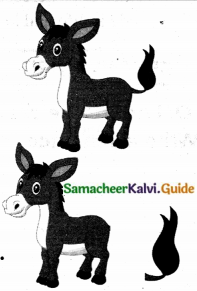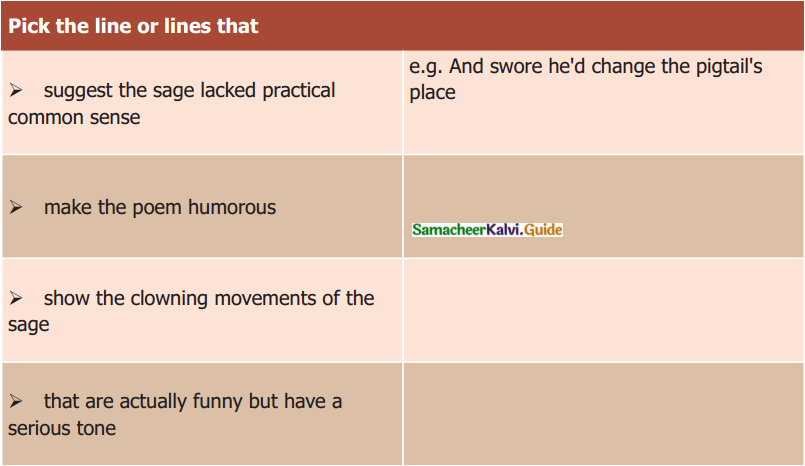Tamilnadu State Board New Syllabus Samacheer Kalvi 6th English Guide Pdf Term 3 Poem 2 A Tragic Story Text Book Back Questions and Answers, Summary, Notes.
Tamilnadu Samacheer Kalvi 6th English Solutions Term 3 Poem 2 A Tragic Story
6th English A Tragic Story Text Book Back Questions and Answers
Warm Up (Text Book Page No. 106)
Pin the tail on the donkey.

Scan here to get the picture of the donkey.
Get the tail of the donkey cut off from the picture.
Textual Exercises (Text Book Page No. 107)
A. Answer the following:
1. What made the sage upset?
Answer:
The sage was upset, as his pigtail hung behind him.
2. Why did the sage spin all day?
Answer:
The sage span all day to change the Pigtail’s place.
![]()
3. What solution did he arrive at for the mystery that he found?
Answer:
He thought that if turned him round, he can change the position of his pigtail.
4. Was he finally succeeded in changing his pigtail’s position? Support your answer with a line from the poem.
Answer:
No, he was not successful finally in changing his pigtail’s position. ‘The Pigtail hangs behind him’.
5. Did something dreadful happens? How would you describe the events in the Poem- comedy or tragedy?
Answer:
No, nothing dreadful happened. The events in the poem are humorous. The illogical behaviour of the sage creates humour throughout the poem.
B. Read the poem lines and answer the questions given below: (Text Book Page No. 107)
1. But wondered much and sorrowed more Because it hung behind him.
a) What was he wondering about?
Answer:
He was wondering about the pigtail.
![]()
b) What does the word ’it’ refer to here?
Answer:
‘It’ refers to the Pigtail here.
2. And though his efforts never slack And though he twist, and twirl, and tack,
Alas! Still faithful to his back
The pigtail hangs behind him.
a) Pick out the rhyming words from the above lines and give the rhyme scheme for the same?
Answer:
Rhyming words: sack – tack – back
Rhyme scheme: a a a b
b) Did he quit his trying? How can you say?
Answer:
No, he did not quit his trying. The lines ‘And though his efforts never slack. And though he twists and twirls and tacks” shows that he did not stop his trying.
3. ‘He mused upon this curious case’
what is the figure of speech used in this line?
Answer:
Personification.
![]()
4. Irony is a figure of speech in which words are used in such a way that their intended meaning is different from the actual meaning. It may also be a situation that ends up quite different from the actual meaning. It may also be a situation that ends up in quite a different way than what is generally anticipated. In simple words, it is a difference between appearance and reality.
Can this poem be called an ironic poem? Justify your answer.
Yes, this poem is an ironic poem because the word ‘sage’ is used in an ironic sense to refer to a person who is dull-witted. It insists on how learned men lack practical sense.
This poem can be called an ironic poem. The character in this poem is a wise man. He has a handsome Pigtail. Naturally, it will hang behind the person. In spite of being wise, he decides to change his position. He knows it well. But he tries to change its position. He wants it to hang on his face.
How funny the idea is! The ways he follows to changes its place are full of irony. He turns him round and round, out and in, he spins all day. It all ends in vain. But he does not want to give up his trying. The poet ends the poem by saying. The Pigtail remains faithful to his back. So the poem ends with irony.
C. Fill in the table with the appropriate poem lines. A few lines may be used more than one time. (Text Book Page No. 108)

D. The summary of the poem is given. But there are some words missing. Fill in the blanks with the help of the box given below. (Text Book Page No. 108)

Once upon a time, there lived a sage He had a handsome pigtail He was worried and pondered over his pigtail’s place. He wanted to change its place. He wanted it hanging on his face. He didn’t like it hanging there behind him. So he turned right and left and roundabout, up and down and in and out but it still hung behind him. However he tried, his efforts were in vain. But he didn’t slack in his efforts. Nevertheless, his pigtail hung faithfully behind him.
6th English Guide A Tragic Story Additional Appreciation Questions
1. He mused upon this curious case And swore he’d change the pigtail’s place
a) What did he think upon?
Answer:
He thought upon ‘this curious case’.
b) What did he swear?
Answer:
He swore that he would change the pigtail’s place.
![]()
2. And swore he’d change the pigtail’s place,
And have it hanging at his face
Not dangling there behind him.
Pick out the alliterated words.
Alliterated words:
Answer:
Pigtail’s – place
have – hanging – his
3. Says he, ” The mystery I’ve found-
Says he, ” The mystery I’ve found.
a) Who speaks here?
Answer:
The sage speaks here.
b) What was the mystery he had found?
Answer:
The mystery he had found was how to change the pigtail’s place.
4. Then round and round, and out and in,
All-day the puzzled sage did spin; In vain.
a) What did the sage do?
Answer:
The sage span round and round and out and in.
b) Did he succeed in his trying?
Answer:
No, he did not succeed in his trying.
![]()
5. ‘Alas! still faithful to his back,
The pigtail hangs behind him.’
a) Who does hang behind him?
Answer:
The pigtail hangs behind him.
b) Who is faithful?
Answer:
The pigtail remains faithful to his back.
A Tragic Story Summary in English
A sage lives a long ago, He had a handsome pigtail it. He felt sad as well as happy because it hung behind him so He was not able to see it. He wanted to change the pigtail is the place from the back to the front of his face. So he tried to change and round and out and in but in vain. The pigtail hung behind him. But he did not give up. Alas! The pigtail hangs behind him.
A Tragic Story Summary in Tamil
| ஒரு முனிவர் முன்பு வாழ்ந்தார். அவருக்கு ஒரு அழகான சடை இருந்தது. அவருக்கு சோகமாகவும் | மகிழ்ச்சியாகவும் இருப்பதாக உணர்ந்தார். ஏனென்றால் அவருக்குப் பின்னால் தொங்கியதால் அவரால் அதைப் பார்க்க முடியவில்லை. அவர் சடையில் இடத்தை பின்புறத்தை தனது முகத்தின் முன்னால் மாற்ற விரும்பினார். எனவே அவர் அதை சுற்றினர் உள்ளே, வெளியே ஆட்டினர். ஆனால் அவரது முயற்சி பலனளிக்கவில்லை. சடை அவருக்குப் பின்னால் தொங்கியது. ஆனால் அவர் விடவில்லை. ஐயோ! சடை அவருக்குப் பின்னால் தொங்குகிறது.
A Tragic Story About the Author in English
William Makepeace Thackeray (18 July 1811 – 24 December 1863) was an English novelist of the 19th century. He was famous for his satirical works, particularly. Vanity Fair, a panoramic portrait of English society.
A Tragic Story About the Author in Tamil
வில்லியம் மேக்பிஸ் தாக்கரே 18, ஜூலை 1811-24 டிசம்பர் 1863) 19ஆம் நூற்றாண்டின் ஆங்கில நாவலாசிரியர் ஆவார். அவர் தனது நையாண்டி படைப்புகளுக்கு குறிப்பாக பிரபலமானவர். வேனிட்டி ஃபேர் ஆங்கில சமுதாயத்தின் பரந்த உருவப்படம்.